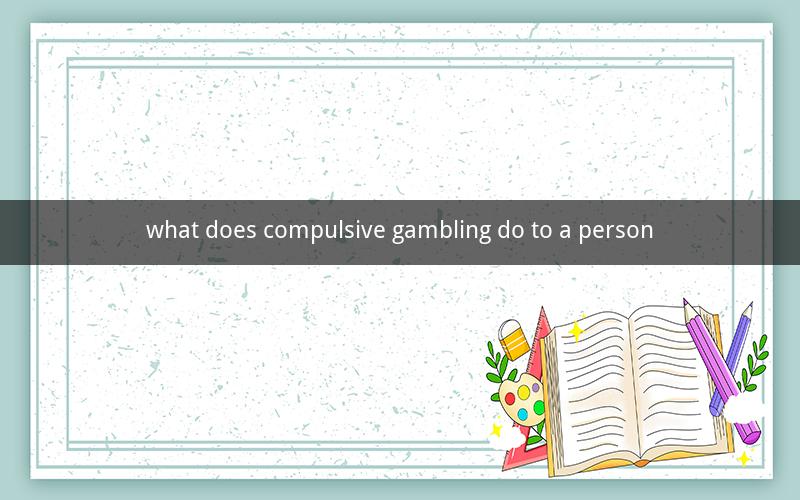
Compulsive Gambling: Its Effects on Individuals
Table of Contents
1. Understanding Compulsive Gambling
2. The Psychological Impact
3. The Social Consequences
4. Financial Ruin
5. Legal and Criminal Implications
6. Health Risks
7. Treatment and Recovery
8. Support Systems
9. Prevention and Education
10. Conclusion
1. Understanding Compulsive Gambling
Compulsive gambling, also known as problem gambling or gambling addiction, is a behavioral disorder characterized by an inability to control the urge to gamble. It is a condition that affects individuals of all ages, genders, and socioeconomic backgrounds. Understanding the nature of compulsive gambling is crucial in recognizing its impact on a person's life.
2. The Psychological Impact
The psychological effects of compulsive gambling are profound. Individuals may experience feelings of guilt, shame, and remorse after losing money. This can lead to depression, anxiety, and other mental health issues. The addiction can also cause stress, relationship problems, and a general sense of dissatisfaction with life.
3. The Social Consequences
Compulsive gambling can have severe social consequences. Relationships with family and friends may suffer due to financial strain and trust issues. Individuals may become isolated, as they may feel ashamed or embarrassed about their addiction. This can lead to loneliness and a breakdown in social support networks.
4. Financial Ruin
One of the most immediate and devastating effects of compulsive gambling is financial ruin. Individuals may go into debt, sell off assets, and even commit fraud to support their gambling habit. The financial strain can also lead to job loss and a decline in overall quality of life.
5. Legal and Criminal Implications
Compulsive gamblers may engage in illegal activities to fund their addiction, such as theft, fraud, or embezzlement. This can lead to legal consequences, including fines, imprisonment, and a criminal record. Additionally, the addiction may lead to illegal gambling activities, further exacerbating the legal risks.
6. Health Risks
The physical health risks associated with compulsive gambling are significant. Stress and anxiety can lead to high blood pressure, heart disease, and other health issues. Sleep deprivation, poor nutrition, and a lack of exercise are also common due to the time and energy spent on gambling.
7. Treatment and Recovery
Treatment for compulsive gambling involves a combination of therapy, support groups, and sometimes medication. Therapy can help individuals understand the underlying causes of their addiction and develop coping strategies. Support groups provide a sense of community and shared experiences, which can be invaluable in the recovery process.
8. Support Systems
Support systems are essential for individuals struggling with compulsive gambling. This can include family, friends, therapists, and support groups. Building a strong support network can help individuals stay motivated and committed to their recovery journey.
9. Prevention and Education
Preventing compulsive gambling involves education and awareness. By understanding the risks and consequences of gambling, individuals can make informed decisions about their gambling habits. Education can also help identify early signs of problem gambling, allowing for early intervention.
10. Conclusion
Compulsive gambling is a complex and challenging addiction that can have far-reaching effects on an individual's life. From psychological and social consequences to financial ruin and legal implications, the impact of this addiction is profound. However, with proper treatment, support, and education, individuals can overcome their addiction and rebuild their lives.
Questions and Answers
1. What are the primary psychological effects of compulsive gambling?
- Compulsive gambling can lead to depression, anxiety, guilt, shame, and a general sense of dissatisfaction with life.
2. How does compulsive gambling affect social relationships?
- It can strain relationships with family and friends, leading to isolation and a breakdown in social support networks.
3. What are the financial consequences of compulsive gambling?
- It can result in debt, the sale of assets, job loss, and a decline in overall quality of life.
4. What legal risks are associated with compulsive gambling?
- It may lead to illegal activities such as theft, fraud, or embezzlement, resulting in fines, imprisonment, and a criminal record.
5. What health risks are associated with compulsive gambling?
- It can cause stress-related health issues, such as high blood pressure, heart disease, and sleep deprivation.
6. What types of treatment are available for compulsive gambling?
- Treatment includes therapy, support groups, and sometimes medication to address the underlying causes and develop coping strategies.
7. How can individuals prevent compulsive gambling?
- Education and awareness about the risks and consequences of gambling can help individuals make informed decisions about their gambling habits.
8. What role do support systems play in the recovery process?
- Support systems, including family, friends, therapists, and support groups, provide motivation and a sense of community during recovery.
9. How can early intervention help in treating compulsive gambling?
- Early intervention can help identify and address the addiction before it becomes severe, increasing the chances of successful recovery.
10. What is the importance of education in preventing compulsive gambling?
- Education helps individuals understand the risks and consequences of gambling, enabling them to make responsible decisions and seek help if needed.